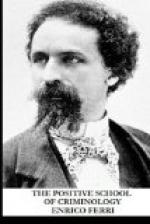We believe, in other words, that repression will play but an unimportant role in the future. We believe that every branch of legislation will come to prefer the remedies of social hygiene to those symptomatic remedies and apply them from day to day. And thus we come to the theory of the prevention of crime. Some say: “it is better to repress than to prevent.” Others say: “It is better to prevent than to repress.” In order to solve this conflict we must remember that there are two widely different kinds of repression. There is the immediate, direct empirical repression, which does not investigate the cause of criminality, but waits until the crime is about to be committed. That is police prevention. There is on the other hand a social prevention which has an indirect and more remote function, which does not wait until crime is about to be committed, but locates the causes of crime in poverty, abandoned children, trampdom, etc, and seeks to prevent these conditions by remote and indirect means. In Italy, prevention is anonymous with arrest. That is to say, by repression is understood only police repression. Under these circumstances, it is well to take it for granted that some of the expected crimes will be carried out, for crimes are not committed at fixed periods after first informing the police. The damage done by criminality, and especially by political and social criminality, against which police repression is particularly directed, will be smaller than that done by the abuse inseparably connected with police power. In the case of atavistic criminality, prevention does not mean handcuffing of the man who is about to commit a crime, but devising such economic and educational measures in the family and administration as will eliminate the causes of crime or attenuate them, precisely because punishment is less effective than prevention.
In other words, in order to prevent crime, we must have recourse to measures which I have called “substitutes for punishment,” and which prevent, the development of crime, because they go to the source in order to do away with effects.
Bentham narrates that the postal service in England, in the 18th century, was in the hands of stage drivers, but this service was not connected with the carrying of passengers, as became the custom later. And then it was impossible to get the drivers to arrive on time, because they stopped too often at the inns. Fines were imposed, imprisonment was resorted to, yet the drivers arrived late. The penalties did not accomplish any results so long as the causes remained. Then the idea was conceived to carry passengers on the postal stages, and that stopped the drivers from being late, because whenever they made a halt, the passengers, who had an interest in arriving on time, called the drivers and did not give them much time to linger. This is an illustration of a substitute for punishment.




